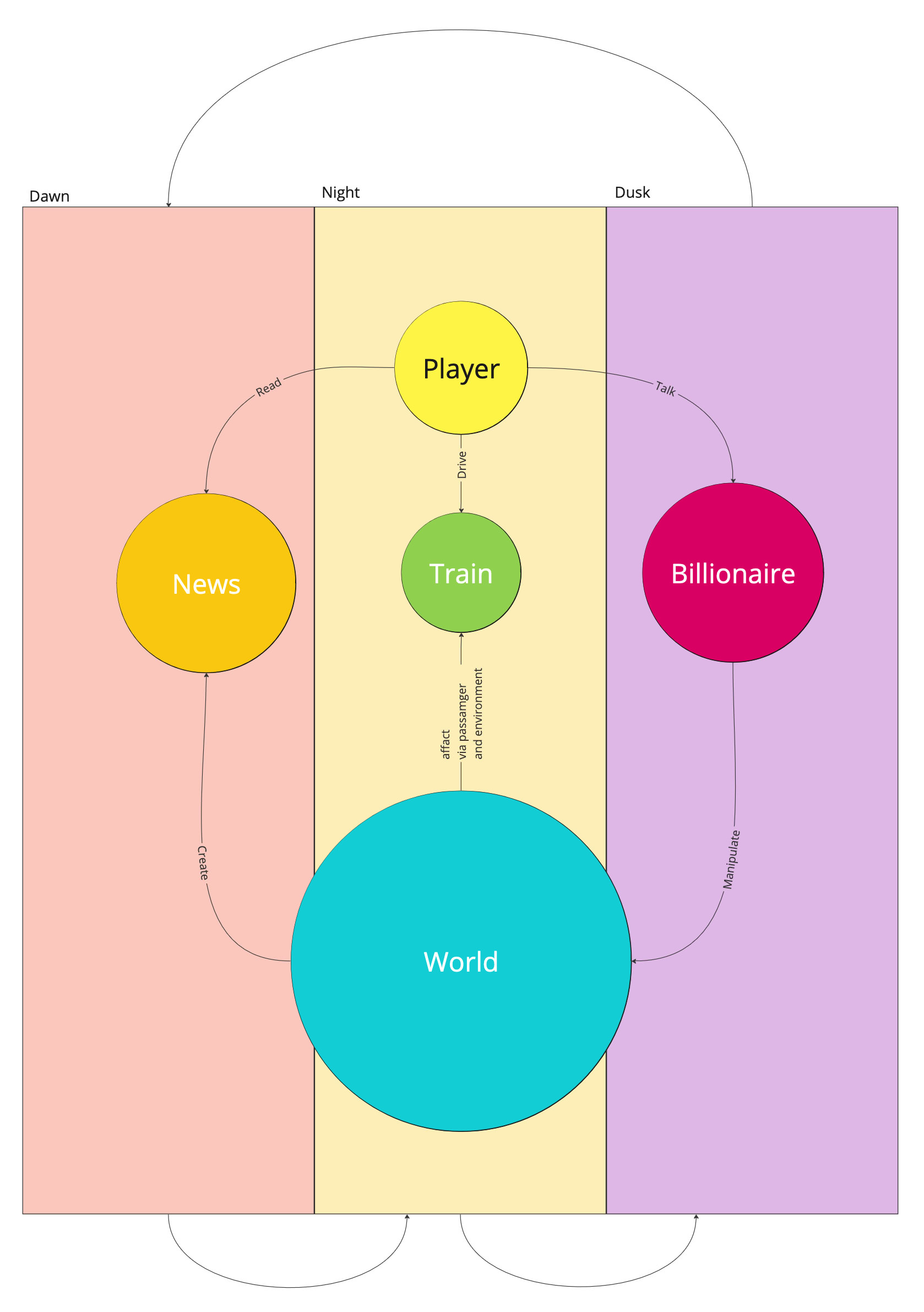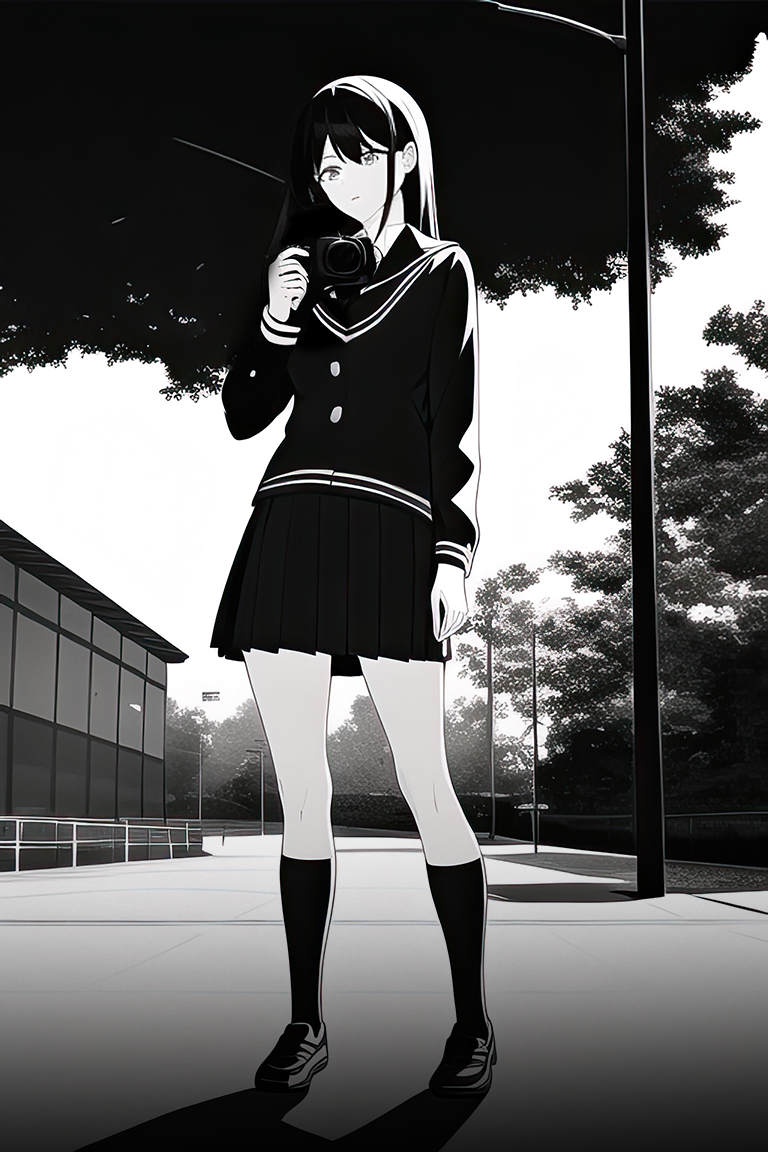Even for those who advocate for social justice, it's not always clear how to "fix" the system.
Night Rail puts you in the driver seat of a long-distance night-time rail journey that stretches the country. From an unexpected encounter on the internet, you find yourself having to make decision that shape the world in unexpected ways.
Narrative Design
Driving the train out of dimly-lit train depot accompanied by a night time radio show and copy of the daily national newspaper, on the surface everything seems like a typical day, emulating a typical simulation game. This is the initial equilibrium of the story. You are a train driver, you've got a timetable, and a secure compartment that shields you from the elements.
This part of the game is supposed to feel safe, almost relaxing, but there's still a hint of unease as the train ventures into the apparent endless dark of night. You're pretty much trapped, there's nowhere the player can go; their only option is to stay in the cab until they finish their 3-to-5-minute train ride, at which point the game takes us to the studio apartment of the train driver which is the only other location in the game.
In the apartment, the player is again shielded from the outside world with closed shades during the day, the time when the driver is supposed to sleep. From here, the balance is disrupted as the worlds status quo begins unravelling. The player receives a message on a dark web forum from a mysterious person who asks seemingly innocent questions: What would you do if a stranger asked for a place to stay? How would you split an apple up between two children?
The stranger lures the player in with straight-forward questions that can be answered instinctively, only for the player to be confronted with a convincing counterargument on a life-or-death situation.
The work/rest cycle repeats, and any decisions made in the apartment section bleed back into the train driving section: there might be more homeless people on the platform, people lining up to flee the country, or soldiers boarding onto the train to weed out the rebellion.
Driving the train became harder, and any delay will eat into the time to progress the conversation with the stranger. It becomes apparent that the stranger applies the same logic in the discussion to manipulate world events, and in the second half of the game, the player can challenge the stranger, reveal his identity, and perhaps restore some balance to the world.
Branching Narrative
Even for those who advocate for social justice, it's not always clear how to "fix" the system. Extreme compassion can destabilize society, creating unforeseen outcomes that allow greedy people a chance to exploit the system, while stringent policies can hinder progress, among many other drawbacks. This works in favour of the branching narrative of Night Rail, whereby even if the player makes all the "righteous" choices in the first act, they can still send society into chaos, leading to a second act where they must convince the stranger to dial back their decisions - illustrating the delicate balance required to create not only a fair, just and humane society, but one which is still functional and liveable for its inhabitants.
Game Design
The mechanic of the game is simple, but it provides a good stage to showcase some breathtaking environments and sound design. With just a handful of locations, including the apartment, train depots, a few stations, and the scenery along the rail line; variation to these locations can be found through experimenting with different lighting and treatments to depict the unfolding disasters and various scenarios that descend upon the game world.
Director's Statement
Kevin:
What excites me about Night Rail is that it explores human psychology in a way that no other medium can. Games can throw players in all sorts of stressful and traumatic situations that allow us to learn so much more about ourselves that other experiments are unable to provide without significant ethical concerns.
The guilt that comes from pressing a button in a game is not so different from committing an immoral act in real life, and the scenario of online actions affecting a driver's daily work is a reflection of reality. Being behind the windscreen, behind closed curtains, and behind a screen doesn't shield you from the suffering in the world, as we all endure the aftermath of politics every day. But, people's mindsets can make all the difference.
- Media : 3D
- Genre : Visual Novel, Adventure
- Platform : Windows, MacOS
- Release Year : TBA
- Tags : Single Player, Brancing Narrative, Consequences
- Riveting Moral Choices
- NPC and World that Reacts to Your Choices
- Gain Control of your Train, Your Fate, and Shape the World
- Inspiration: Contraband Police - Crazy Rocks

 previous
previous


